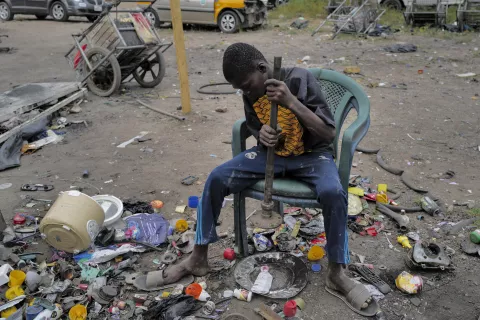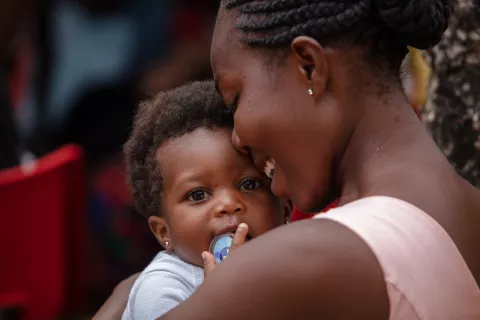Strategic partnerships to prevent children’s exposure to lead
Akosua Mensah’s story

22 March 2022, GREATER ACCRA – Akosua Mensah, a factory worker at a wet cell recycling plant in the Greater Accra, feeling out of breath, lowers her face mask under her chin and continues to wash components from discarded lead car batteries. She is surrounded by hundreds of lead car batteries.
Not too far from her are four other women doing a similar job, with no idea of the risk of exposure to the dangerous chemicals and metals they work with. On a normal day, she would have about 10 other women working with her, most of whom have children at home or live with families.

Akosua arrived in Accra 5 years ago to make a better life for herself. Her parents did not have enough money to take her through primary school, so she dropped out. A few years later, to make a living, she opted to learn dressmaking as a trade. However, that also fell through the cracks half-way due to financial constraints.
“The moment I arrived in Accra I knew I needed to get a job very quickly. Any job – so I could afford decent accommodation, and something left over to buy food and other essentials every day.” Akosua shared.
After a few weeks of searching, she found work at a wet cell battery recycling plant in the Greater Accra region. In the beginning, she was grateful to have found a job. But not long after, she realized her daily earnings – $2.40/per day – would barely sustain a decent living. Her relationship with the place has been on-and-off.

However, without any other skill sets to gain her meaningful employment, she feels stuck in her present situation. Women working with Akosua spend their day performing strenuous tasks yet barely meeting their financial needs due to the meagre salaries.
Even worse, their working environment exposes them daily to dangerous chemicals and heavy metals such as acid and lead. Akosua and her colleagues are not happy with the working conditions at the factory but are afraid to speak up because they could lose their jobs.
"I don’t know anything about lead poisoning or how it can affect me. I don’t think any of the women here know either. Some have been coming to work even while pregnant. We have not been provided any training on exposure to these chemicals. It is also difficult for us to demand for proper protective equipment while handling these chemicals. That implies additional cost to our superiors, and they may let you go.”

The possibility of some chemical elements remaining on their clothes, hair and under their fingernails at the factory is very high and children and family members at home are likely to have been exposed as a result.
When lead enters the bloodstream of a pregnant woman, it causes significant harm to the development of the brain of the unborn child in the mother's womb.
To address children’s exposure to lead and its effects, UNICEF and Pure Earth, under the Protecting Every Child’s Potential initiative, is working with the Ghana Factories Inspectorate and the Environment Protection Agency (EPA) to ensure a safe working environment for women like Akosua.

The Ghana Factories Inspectorate works to enforce guidelines which state that all companies that have lead included in their production processes are required to conduct a risk assessment for lead exposure, develop an exposure control plan, write safe work procedures, and implement controls
Together, with the EPA and the Ghana Health Service, UNICEF and the Ghana Factories Inspectorate have been conducting joint visits to selected factories and carried out advocacy and sensitization initiatives to ensure that people like Akosua and many others are given a voice to share their concerns, learn about lead exposure and its effects on their health. Thanks to funding from the Clarios Foundation, these initiatives are impacting organizations and individuals.

[A wet cell battery is a type of rechargeable battery. It is commonly found in aviation, electric utilities, energy storage and cellphone towers. The battery contains a liquid electrolyte such as sulfuric acid, a dangerous corrosive liquid.]




